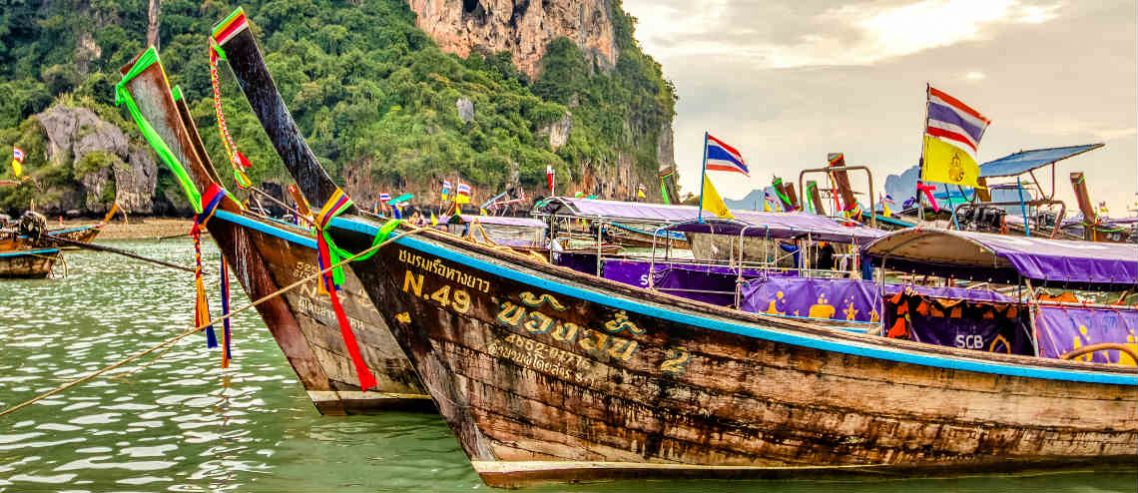Thailand tourism updates: domestic vs international
Thailand and tourism go hand in hand – it’s hard to imagine a time when the country didn’t welcome visitors. From its white sandy beaches and world-famous nightlife to stunning historical temples and ubiquitous street-food culture, there’s no denying that the country is a tourists’ paradise.
Unfortunately, since the start of the pandemic, travel restrictions have been in place to prevent the spread of COVID-19. Thailand is currently closed to foreign visitors and there’s no sign of the country opening soon. Instead, the focus has shifted to domestic travel. In this Pacific Prime Thailand article, we give you all the latest travel updates.
International tourism
The Thai authorities have been very strict with their travel ban – all foreign arrivals, including families of Thai nationals stranded abroad, have been denied entry. While this is generally seen as a prudent measure for containing the virus, which Thailand has done exceptionally well at, Thai businesses reliant on tourism have suffered.
In terms of Gross Domestic Product (GDP), the tourism industry accounts for 12%. Foreign tourists arrivals hit a record 39.8 million last year, equivalent to more than half of the country’s population, and was predicted to grow further this year. Therefore, the question on everyone’s mind is: “When will foreign tourists be allowed back in the country?”.
Although tourism-dependent countries like Spain are now open for business, Thailand remains firm in its decision to keep its borders shut. The travel ban currently remains in place until June 30th, but there has been no news as yet on the lifting of the ban. It seems likely that a travel ban of some sort will still be in place next month.
Yuthasak Supasorn, governor of the Tourism Authority of Thailand (TAT), said in a CNN Travel article that the return of tourists could be in the fourth quarter of this year at the earliest, but everything is “still dependent on the outbreak situation”. He also hints that tourism in Thailand will look very different.
Travel bubbles and high-end tourists
It is likely that Thailand will agree to a “travel bubble”. Essentially, this is when a country opens its borders reciprocally with destinations that also have COVID-19 under control. In addition to this, there are also reports that Thailand wants to take this opportunity to move away from mass tourism and target high-end tourists instead.
Special long-stay packages
Don’t be surprised if tourists will only be allowed to visit certain isolated or closed areas. As Yuthasak said, “We have studied a possibility of offering special long-stay packages in isolated and closed areas where health monitoring can be easily controlled – for example, Koh Pha Ngan and Koh Samui.”
Domestic travel
Domestic air travel in Thailand is currently allowed – having resumed in early May. Initially, there were strict social distancing measures that had to be followed. However, recently, some of these guidelines have been eased given the low number of COVID-19 cases in the country.
To offset the reduced number of foreign tourists, Thailand’s strategy is to encourage domestic tourism. After being forced to close in April, resorts and hotels throughout the country have been allowed to operate since the end of May – provided, of course, that they adhere to certain social distancing and hygiene rules.
It’s a traveler’s market as tourism-related services are aggressively offering discounts. For example, the 5-star hotel chain Marriott is offering deals at 37 of its hotels across Thailand. There’ll be up to 50% discounts on nightly rates, spa treatment, as well as dining – available through June and redeemable through December 30th 2020.
Whether the industry can weather the COVID-19 storm is yet to be seen. Damrong Ong-art, President of the Chiang Mai Tourism Operators Association and owner of the Thai Jungles Zipline warns in a Bangkok Post article that local purchasing power has weakened substantially. But there remain attempts by the authorities to promote travel.
Travel subsidies
In order to encourage travel, the Thai authorities have approved three stimulus packages worth around THB ฿ 22.4 billion. Over the next few months, eligible domestic tourists such as health workers will receive travel subsidies worth THB ฿ 2,000 per person for a minimum one-night trip amongst others.
Songkran holidays
There is a possibility that the Songkran holidays, canceled at the peak of the COVID-19 crisis in April this year, will be postponed to sometime in July. Traditionally, the Thai new year results in at least a three-day public holiday and a mass migration of people across provinces. It is hoped that this could give the tourism industry a much-needed boost.
Get in touch with Pacific Prime
As the domestic tourism industry is returning to normalcy, expats currently in Thailand will be glad to know they can go on short trips. However, foreigners in the country should bear in mind that they may face discrimination. For instance, there have been reports of interprovincial bus operators denying entry to non-Thais.
Foreigners and expats, especially during a pandemic, can be left vulnerable. Since the start of the COVID-19 outbreak, Pacific Prime Thailand has been supporting expats with crucial information regarding their stay. Whether it’s the latest travel, visa, or healthcare updates, we are the trusted source for expats in Thailand.
We also provide both travel and expat health insurance advice during this unprecedented time. For the latter, check out these common outpatient treatments covered. If you’d like to get a no-obligation quote, feel free to use our online comparison tool or speak to an advisor today.
- An Overview of Thailand’s Medical Tourism Industry - September 20, 2023
- How to Open a Bank Account in Thailand in 2023 - August 25, 2023
- Thailand Has One of the Highest Suicide Rates in the Region - August 7, 2023





Comments
Comments for this post are closed.
We'll notify you
when our team replies!